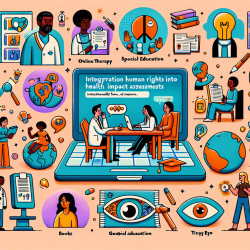Introduction
In the ever-evolving landscape of public health, understanding the dynamics of emergency response is crucial for practitioners, especially those involved in speech-language pathology and related fields. The study titled Determinants of emergency response responsibility perceptions in the local public health workforce after China’s health sector restructuring offers valuable insights into how public health workers perceive their roles during emergencies. This blog explores how practitioners can enhance their skills by applying the outcomes of this research and encourages further exploration into the topic.
Key Findings from the Research
The research conducted in Heilongjiang, China, highlights several critical findings:
- The correct recognition rate of public health emergency (PHE) responsibilities among Health Inspection Institution (HII) workers was low, indicating a need for improved training and clarity in job roles.
- Factors such as department affiliation, work experience in a CDC, and prior PHE response experience significantly influenced workers' perceptions of their responsibilities.
- There was a notable lack of coordination between the Centers for Disease Control (CDC) and HIIs, leading to confusion and inefficiencies in emergency response.
Implications for Practitioners
For practitioners in speech-language pathology, understanding the implications of this research can enhance their ability to respond effectively in emergency situations. Here are some actionable steps:
- Training and Education: Regular training sessions should be implemented to ensure practitioners are well-versed in their roles during emergencies. This includes understanding the specific responsibilities of their department and how it integrates with other public health sectors.
- Interdepartmental Coordination: Encouraging collaboration and communication between different health departments can reduce role overlap and enhance the efficiency of emergency responses.
- Experience Sharing: Creating platforms for practitioners to share experiences from past PHE responses can provide valuable learning opportunities and improve preparedness.
Encouraging Further Research
The study underscores the importance of ongoing research to address the gaps in emergency response preparedness. Practitioners are encouraged to engage in research initiatives that explore the following areas:
- The impact of structured training programs on emergency response effectiveness.
- Strategies for improving interagency cooperation and communication.
- Methods for accurately assessing and enhancing practitioners' understanding of their emergency response roles.
Conclusion
The research provides a foundation for improving emergency response preparedness among public health practitioners. By implementing the study's findings, practitioners can enhance their skills, ensure clarity in their roles, and ultimately contribute to more effective public health outcomes. For those interested in delving deeper into the research, the original paper offers comprehensive insights and can be accessed here.










